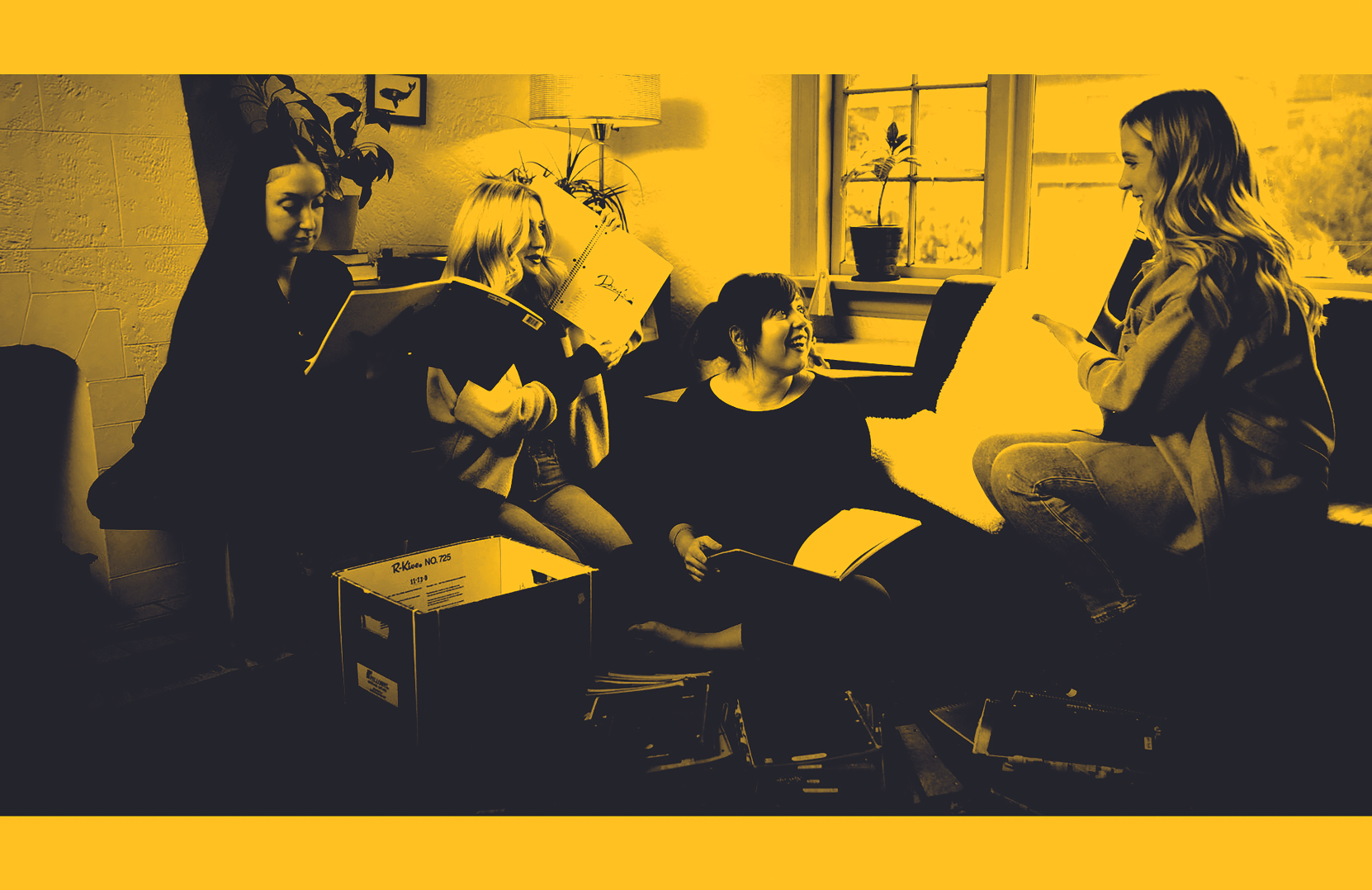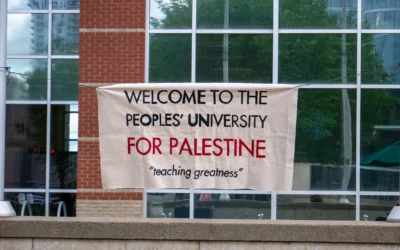The Edmonton International Film Festival (EIFF) has been giving us brilliant films, providing an escape from reality, and bringing us together since 1986. After all, nothing says community like sharing a bag of buttery popcorn, a fizzy drink, and the big screen.
What used to be a smaller, three-day film festival has grown into a full-fledged, ten-day event. EIFF is Oscar-qualifying, recognized as one of the top film festivals in the country, and listed as one of Moviemaker Magazine’s “50 festivals worth the entry fee.”
Since 2020, the festival has been either fully online or offered to viewers in a hybrid format with both in-theatre and digital, streamable films. This year, EIFF was able to get back to normal. The Landmark Cinemas theatre in downtown Edmonton was open with full access to screening rooms, concessions, and other festivities for all attendees.
The festival ran from Sept. 22 to Oct. 1. I attended six of the ten days of the festival and loved every minute of it. Being back in person was a great experience. It convinced me that it’s how films are meant to be watched — in real, uninterrupted time in a quiet theatre. The accessibility of a virtual screening may be nice, but it’s a completely different experience than watching a film in theatres.
Artistic Director Vincent Brulotte says the transition back to in-theatre screenings was tough to adapt to for the EIFF team while still in a pandemic. “We’re only the second Canadian festival to do in-theatre exclusively,” Brulotte says. “(It’s been) crazy. It’s awesome. We’re really, really happy about it. The plan, up until a few months ago, was to do hybrid again this year.… and then push came to shove…. and we thought, ‘Let’s just do it exclusively in theatre!’”
After opening night, I was hooked. I wanted to see as many films as I could without straining my eyes for ten days straight. I returned the following afternoon to watch the first round of short films — called Lunchbox Shorts. These two-hour screenings consisted of five to eight unique, short films. I was introduced to foreign, animated, and musical films, and thought that they were all really engaging and special in their own way. Here are some film overviews of my highlights from the festival.
ECSTASY
Ecstasy was one of my favourite short films at the festival. It’s an 18-minute short about a young boy whose father has Parkinson’s disease. When they discover that the drug MDMA — more commonly known by the name Ecstasy — might be able to reduce the symptoms of Parkinson’s, the characters go on a short-lived journey to buy just one pill.
Filmmaker and director Grant Taylor spoke to me about what it’s like to have a father with a disability. “I think that if you have a disability or (disabled) care in your life, it’s really hard, but it’s important to be optimistic,” he says. “Even though things are tough….being hopeful is really powerful.” The film itself isn’t about drugs or having a disease; it’s about not letting disability define you and making the most of life.
The story, although not based on true events, is a dedication to his own father, and what life was like seeing someone you love deal with Parkinson’s while growing up. “I suppose I always wanted to make a movie that was a bit different and wasn’t really miserable, and had a bit of joy in it as well as making you cry,” he adds. Taylor’s film is funny and sweet, and it perfectly captures why finding time for the things that matter is so important.
I LIKE MOVIES
I Like Movies was no doubt my favourite film that I saw at the festival. The comedic, Canadian film from director Chandler Levack was absolutely brilliant. It features an Ontario highschool senior, Lawrence (Isaiah Lehtinen), in the early 2000s who loses his father to suicide. He lives with his single mother, hangs out with his best friend Matt, and loves movies; in fact, his entire life revolves around them. His dream is to attend the NYU Tisch School of the Arts for film, but there’s one problem: he has no money. When he gets a job at a local video store, he befriends an odd group of individuals who have a life changing impact on him as he navigates his way through trauma, loss, and the most complex one of all, adolescence.
I Like Movies is a feel-good film about teenage life in Canada, and “they really nailed the early 2000s vibe,” Brulotte shares. The movie is hilarious from beginning to end, and makes for a true, entertaining coming-of-age story.
AFTERSUN
Director Charlotte Wells’ Aftersun is intimate and haunting. It’s a sensitive, masterful film about nothing and everything all at once. A grown woman, Sophie, looks back at old home-videos of her younger self (Francesca Corio) from a vacation she took with her father (Paul Mescal) 20 years before.
Aftersun is a stunning, unforgettable ode to our memories and how we embrace them, and it’s a piece of cinema that people will be talking about for years to come. The father-daughter relationship creates a complex story that only exists between memory and imagination, where viewers are forced to fill in the blanks. “It really hits you at the end of it,” Brulotte adds. “You’re just like, floored.” I couldn’t agree more. This film will break your heart into a million pieces and then ever so slowly put it back together again.
DOUG AND THE SLUGS AND ME
Doug and The Slugs and Me, a Teresa Alfeld film, tells the story of the rise and fall of famous Vancouver band, Doug and The Slugs. The documentary includes interviews with band members, family and friends, other artists, and of course, the filmmaker Teresa — who was Doug Bennet’s next door neighbour and family friend to his daughters while growing up.
Throughout the documentary, Teresa uncovers many of Doug’s old journals, which contained song lyrics, real life stories, and personal pieces of writing. Seeing the other band members tell the story of how the group came to be was really special to see on the big screen, but having access to Doug Bennet’s old journals played a huge role in the movie. “In some ways, it was like sitting down and being able to interview him now,” Alfeld says, “I had all the answers suddenly available to me.” Although just a kid when Doug and The Slugs were performing, Alfeld remembers always being with the family and how Doug’s career — to the kids— was being a “rockstar.”
In 2004, after Doug’s daughters — Della, Shea, and Devon — and Teresa had grown apart, Doug died at 52 from an ongoing illness. Years later, Alfeld was able to look back at the band’s history and find a really interesting story. “What surprised me most was that I started to relate to Doug,” she says, “He’s talking about balancing his artistic pursuits and family and feeling like he isn’t where he wants to be; I’m just like, ‘Oh shit! This is getting real,’ and I get it.”
This documentary is amazing not because it highlights one of the most famous Canadian bands, but because of the way it brings their memory back to life. Older generations might have been more familiar with the group, but it’s just as important for young people to learn and care about the band and enjoy their music now. “(Before this film) I had no idea who Doug and The Slugs even were, but (the film) was really cool,” Brulotte says, “(the EIFF team) really liked it.”
So, the question remains: Why Doug and The Slugs? What sets them apart from other artists? Their story is really special; anyone can get together and call it a band, but Doug took making music and performing live to an entirely new level. “A band like Doug and The Slugs — they were the original road warriors. They played every city they could, they toured every summer, and they showed up,” Alfeld says. “I think that Doug and The Slugs represents an incredible artistic energy, dedication, talent, and more than anything, a work ethic.”
TRIANGLE OF SADNESS
When I went to watch Ruben Ostlund’s Triangle of Sadness, I walked into an entirely sold out theatre. The gendered and social class power dynamics frame the story of the film perfectly. This dramatic satire was one of the most hilarious, disgusting, and yet somehow eye-opening films that I’ve ever seen. It all starts with a young, celebrity model couple, Carl (Harris Dickinson) and Yaya (late actress Charlbi Dean Kriek), who join many other super rich individuals on a $250 million luxury yacht. The guests? Wealthy and spoiled. The staff? Underpaid and overworked. Sound familiar?
When the ship’s drunk captain (Woody Harrelson) serves the guests fresh seafood mixed with a bumpy yacht ride, a recipe for disaster begins. Heads up! If you can’t stomach watching people puke, this film is unfortunately not for you. From chaotic model runway shows, a 20-minute long vomiting scene, and the ship sinking, this movie is never boring; it has action, politics, lust, and, most of all, humour.
Triangle of Sadness tests what happens when money becomes worthless and the over-privileged survivors must rely on alliances and skills to fend for themselves. The film reveals everything that we’re dealing with in society today: the link between power and beauty, capitalism, global warming, and, undeniably, naiveté. I was either laughing, gasping, or squirming in discomfort along with the audience through it all, but sometimes it takes such extreme emotions to get a point across, and this film did just that.
ALTARS
On the last day of the festival, I saw a collection of short films that highlighted many relevant issues: accepting individuals in the LGBTQ+ community, racial profiling, and police brutality. I loved seeing diverse films that tell important stories, and out of the eight shorts, most of them featured all-black casts. The film that stuck with me the most was Mariona Lloreta’s story inspired by her own fiancé — a black man — and her experience witnessing real life events.
Altars, a 14-minute film about police brutality attacks across the U.S., tells the story of Tyson, a black man who discovers that he’s going to be a father. Altars portrays Tyson’s story of police brutality and the fight for survival through dance and poetic filmmaking. The dramatic ending left me feeling moved and inspired.
EIFF was one of Edmonton’s best events. From the brilliant films to the engaging conversations with filmmakers and directors, it’s an amazing experience for any film lover. I hope to see some of these films at the Academy, and in the meantime, I highly recommend that everyone watches them, whether on the big screen, or from home.
The festival was more than just ten days of watching movies. It reminded me what being a part of the community was really like. Talking to the individuals involved in the films gave a personal touch to the event and helped attendees explore the world of film from a new perspective. EIFF opened up my eyes — and heart — to major issues in society while also providing me with some comedic relief from a busy, stressful life. The EIFF team and staff at Landmark Cinemas put on a great event for all attendees, and made the 10-day festival extremely special. Until next year, EIFF.





0 Comments